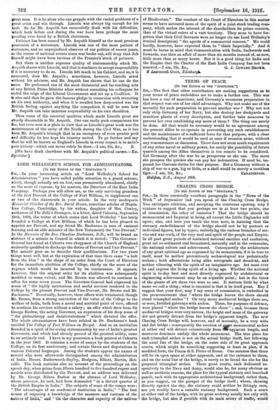LORD WELLESLEY'S SCHOOL FOR ADMINISTRATORS. [To THE EDITOR OF THE
" SPECTATOR.1 your interesting article on "Lord Wellesley's School for Administrators " you have called public attention to a grand scheme, which, though actually set on foot, was prematurely abandoned, chiefly on the score of expense, by his masters, the Directors of the East India Company. Perhaps you will allow me, as the only surviving grandson of the first Provost of the College of Fort William, to supplement one or two of the statements in your article. In the very inadequate Memorial Sketches of the Rev. David Brown, sometime scholar of Magda- lene College, Cambridge, by his widow, daughter of Mrs. Cowley, authoress of The Belle's Stratagem, is a letter, dated Calcutta, September 24th, 1800, the writer of which states that Lord Wellesley " has lately founded a College at Fort William, of which he has been pleased to appoint me Provost, and my friend Mr. Buchanan (a man of eminent learning and an able minister of the New Testament) the Vice-Provost." In the Memoirs of the Rev. Claudius Buchanan, D.D., will be found an abstract of a minute in Council in which it is stated : "The Governor- General has found at Calcutta two clergymen of the Church of England eminently qualified to discharge the duties of Provost and Vice-Provost." The minute goes on to describe their qualifications. For two years things went well, but at the expiration of that time there came " a bolt from the blue" in the shape of an order from the Court of Directors for the immediate abolition of the College, chiefly on the score of the expense which would be incurred by its continuance. It appears, however, that the original order for its abolition was subsequently modified to some extent, and Mr. Brown was allowed to continue in office for some seven years. The Governor-General had expressed his sense of " the highly meritorious and useful services rendered to the College by the present Provost and Vice-Provost, Mr. Brown and Mr. Buchanan." Eventually, however, these offices were terminated, though W. Brown, from a strong conviction of the value of the College to the welfare of India, both from a moral and material point of view, offered to continue his services without a salary ; an offer which drew from Sir George Barlow, the acting Governor, an expression of his deep sense of " the philanthropy and disinterestedness " which dictated the offer. The whole circumstances have been related in Dr. Buchanan's book entitled The College of Fort William in Bengal. And so an institution founded in a spirit of far-seeing statesmanship by one of India's greatest Governors, and which had already proved of the greatest utility, came to an untimely end. I have in my possession a book printed at Calcutta in the year 1802. It contains a series of essays by the students of the College, on its first anniversary, and certain theses and disputations in various Oriental languages. Among the students appear the names of several who were afterwards distinguished among the administrators of India, Messrs. Butterworth-Bayley, Hodgson, Elliott, Martin, Met- calfe. The book contains also an account of the proceedings on the speech-day, when prizes from fifteen hundred to five hundred rupees and medals were distributed by the Provost, and an address was delivered by Mr. George Hilaro Barlow in the absence of Lord Wellesley, whose presence, he said, had been demanded "in a distant quarter of the British Empire in India." The subjects of some of the essays were: " The advantages of an academical institution in Indies" " The best means of acquiring a knowledge of the manners and customs of the Datives of India," and " On the character and capacity of the natives of Hindoostan." The conduct of the Court of Directors in this matter seems to have savoured more of the spirit of a joint stock trading com- pany, which makes the interest of the shareholders its prime concern, than of the virtual rulers of a vast territory. They seem to have for- gotten that their Civil Servants were no longer (to use Lord Wellesley's ironical description) " the agents of a commercial concern." We could hardly, however, have expected them to " think Imperially." And it must be borne in mind that communication with India, backwards and forwards, was then an affair of more than six months instead of, as now, little more than as many hours. But it is a good thing for India and the Empire that the Charter of the East India Company has not been






























 Previous page
Previous page